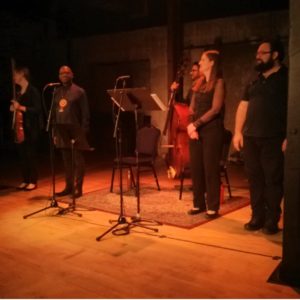 On Friday, March 3, 2017 wasteLAnd presented the music of Klaus Lang at Art Share LA, in the heart of the arts district in downtown Los Angeles. The occasion was the US premiere of missa beati pauperes spiritu and Austrian composer Klaus Lang had planned to be in attendance, but with the recent immigration crackdown his visa was denied by the US. Inside the theater, clusters of players and singers were stationed around the performance space and the crowd arranged itself along the outside edges of the seating area for the best view.
On Friday, March 3, 2017 wasteLAnd presented the music of Klaus Lang at Art Share LA, in the heart of the arts district in downtown Los Angeles. The occasion was the US premiere of missa beati pauperes spiritu and Austrian composer Klaus Lang had planned to be in attendance, but with the recent immigration crackdown his visa was denied by the US. Inside the theater, clusters of players and singers were stationed around the performance space and the crowd arranged itself along the outside edges of the seating area for the best view.
missa beati pauperes spiritu translates from the Latin as “Blessed are the poor in spirit” comes from the sermon on the mount, as related in the gospel of Matthew. The work is roughly based on the form of the mass, with the text of each of the beatitudes included. Lang explains his approach in the program notes: “I think that a mass is not a theological rational discussion of the bible. Instead, its goal and prerequisite is not to fill the mind with the thoughts and pictures, but to make it empty and poor, for the blessed are those that are poor in spirit, and thereby free.”
In fact the Revised Common Lectionary, followed by most mainline Christian churches, lists the sermon on the mount for the gospel text for the Fourth Sunday after Epiphany – January 29 of this year – so this piece was timely. Bell tones and the quiet sounding of a gong by percussionist Dustin Donahue opened the piece, creating a somber, mystical atmosphere complimenting the liturgical season of Lent that had begun a few days earlier. Soon, the other players quietly took their stations and deep, sustained tones were heard in the lower strings that added to the spiritual feeling. In this context, the music of Arvo Pärt came to mind.
At length, cantor Charles Lane intoned a stately “Kyrie Eleison” and the accompanying instruments added their voices in response. The entrances and harmonies were effectively done, given that the players were scattered in small groups across the theater and did not have much visual communication in the darkened space. The strings and trombone were heard mostly in their lower registers while the soprano voice of Stephanie Aston floated high above, a sustained, ethereal presence.
As the piece progressed, a line of text was sung by the cantor and the instrumental accompaniment offered a reflective reply. When the percussion was present, the bells and gong added a touch of the ceremonial while the strings were at times, a comforting presence, or alternately questioning and uncertain. The music was often unsettled, especially in the soprano voice, as if reflecting the tension in the text between the states of poverty, meekness, hunger, thirst and persecution – and the blessedness thus engendered. A number of restless pizzicato passages in the strings also contributed to this, while at other times warm, sustained tones produced a more expectant and hopeful feeling. missa beati pauperes spiritu is a moving and cathartic journey, with all of the conflicting emotions awakened by the text fully realized in this music.
Prior to the beginning of the concert, an electronic sound installation realized by Matt Barbier was heard through speakers as the crowd filed in. This consisted of sustained low humming tones that were fully musical but also hinting at some deep ongoing process. The feeling was warm, but autonomous; benign but not overtly friendly. Intriguingly, the sounds were simultaneously static, yet full of change and never boring. Barbier’s piece nicely set the stage for missa beati pauperes spiritu.
The performers for this concert were:
Charles Lane, cantor
Stephanie Aston, soprano
Matt Barbier, trombone
Dustin Donahue, percussionist
Linnea Powell, viola
Derek Stein, cello
Stephen Pfeifer, double bass
Scott Cazan, electronics
WasteLAnd returns to Art Share LA on Friday, April 7 to present einsamkeit, a concert featuring music by Erik Ulman, Patricia Martinez, Daniel Rothman and Daniel Tacke.
